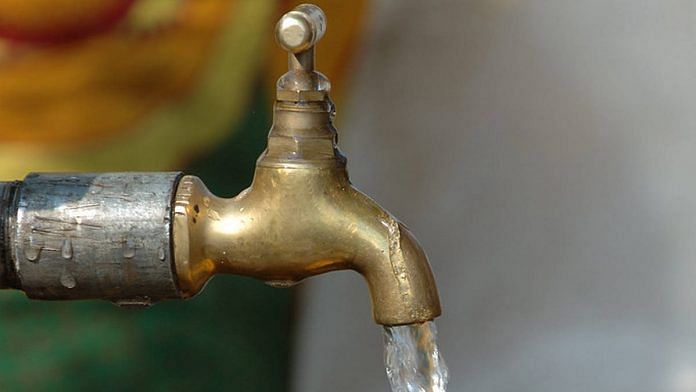New Delhi: The Union Ministry of Jal Shakti has proposed stringent guidelines that ban the grant of no-objection certificates (NOCs) for extracting groundwater to all new industries coming up in ‘over-exploited’ areas, including parts of Delhi, Haryana, Himachal Pradesh, Punjab and Rajasthan, ThePrint has learnt.
The Central Ground Water Board (CGWB) defines ‘over-exploited’ areas as those where the groundwater development is more than 100 per cent, meaning the annual groundwater consumption is more than its recharge.
According to the draft revised guidelines to regulate and control groundwater extraction finalised by the Jal Shakti ministry, and accessed by ThePrint, NOCs in such areas will only be granted to micro, small and medium enterprises. However, NOCs will not be granted to new packaged water industries in over-exploited areas, even if they belong to the MSME category.
The draft guidelines also propose hefty penalties for non-compliance to various conditions that need to be met to get an NOC. The maximum penalty proposed on project proponents is Rs 10 lakh, for injection of treated/untreated water into the aquifer system.
For the first time, the Centre has also proposed levying environmental compensation on industries, infrastructure units and mining projects for extracting groundwater for commercial use without a valid NOC. The minimum environment compensation will not be less than Rs 1 lakh, and will be charged for the quantum of groundwater extracted illegally.
The Jal Shakti ministry has shared the draft guidelines with the states and union territories to seek their comment and suggestions. The ministry will notify the guidelines after receiving these comments.
Also read: Water bodies running dry at alarming rate due to groundwater depletion, reveals study
Why guidelines were revised
The ministry had to draft the revised groundwater extraction guidelines after the National Green Tribunal stayed the earlier guidelines, notified in December 2018, on the grounds that they had “worsened” the groundwater situation by liberalising its extraction, including for commercial purposes.
The revised guidelines are an improvement over the 2018 norms, which did not ban granting NOC to industries for extracting groundwater in over-exploited areas, did not levy environment compensation and hefty penalty for violations.
According to a 2017 assessment of groundwater resources carried out by CGWB, of the total 6,881 assessment units in India, 1,186 have been categorised as over-exploited. Blocks, mandals and taluks etc. are considered assessment units for groundwater resources.
A Jal Shakti ministry report said India uses the most groundwater in the world, extracting 253 bcm (billion cubic metres) per year. This is approximately 25 per cent of the global groundwater extraction.
Who can get an NOC and who can’t?
To give a push to the infrastructure sector, the draft guidelines have not banned the grant of NOCs to new and existing infrastructure and mining projects in ‘over-exploited’ assessment units.
“Since infrastructure projects are location specific, grant of NOC to such projects located in over-exploited assessment units shall not be banned,” the draft guidelines state.
However, in such units, use of groundwater for construction activity will be permitted only if no treated sewage water is available within a 10 km radius of the site.
While new industries will be given NOCs to extract groundwater only for drinking/domestic use of their workforce, the Centre will not permit expansion of existing industries that would involve an increase in the quantum of groundwater extraction in over-exploited areas.
For existing industries, NOCs will be granted on meeting specific conditions, and after payment of extraction charges fixed by the Centre.
The draft guidelines also mandate that all industries extracting groundwater in excess of 100 cubic metres per day will be required to undertake annual water audits through industry bodies like CII and FICCI, and submit their report within three months.
Industrial use is estimated to account for only about 5 per cent of annual groundwater extraction.
The guidelines also make it mandatory for all private tankers extracting groundwater and using it for supply as bulk water suppliers to seek NOC. In over-exploited assessment units, such bulk water suppliers will have to pay groundwater restoration charges at the rate of Rs 35 per cubic metre.
Environmental compensation, hefty penalties
The draft guidelines also propose levying hefty penalties for non-compliance of various conditions for getting NOCs. As mentioned above, the maximum penalty amount is Rs 10 lakh for injecting treated/untreated water into the aquifer system. Apart from coughing up the penalty, the violator will also have to bear the cost of aquifer remediation, according to the provisions of the Environment (Protection) Act, 1986.
Non-registration of water tankers and non-construction of water conservation structures or inadequate capacity of recharge will invite a penalty of Rs 5 lakh.
Non-disclosure/construction of additional groundwater extraction structure will invite a penalty of Rs 2 lakh, as will non-maintenance of water recharge structures and non-registration of drilling rigs.
Submission of false information will invite a penalty of Rs 1 lakh.
Also read: India’s water crisis is forcing farmers to finally rethink what they grow



